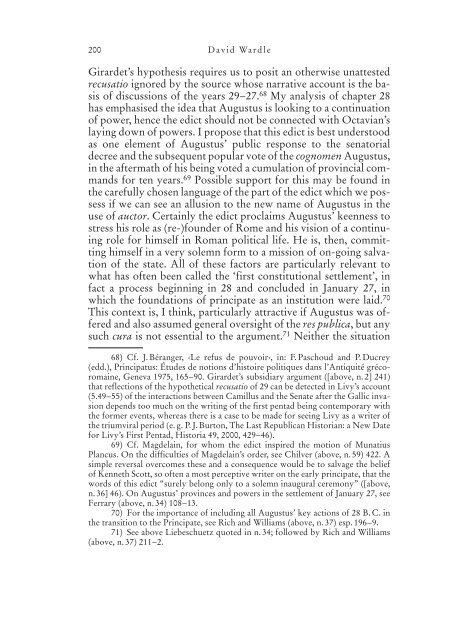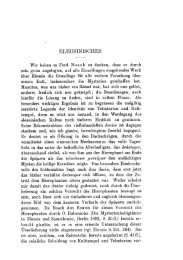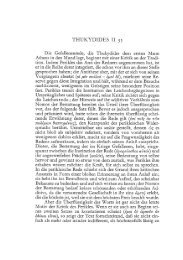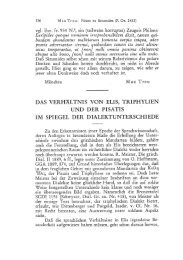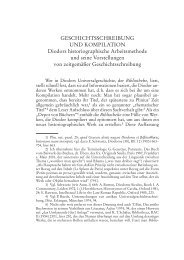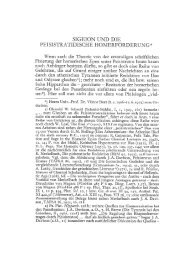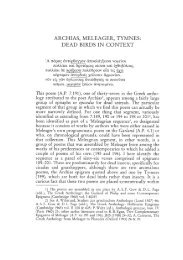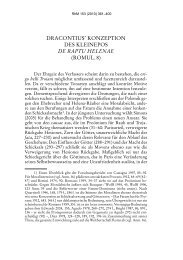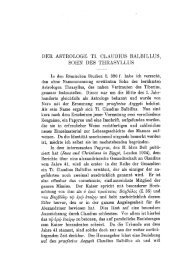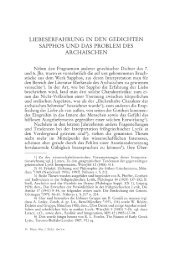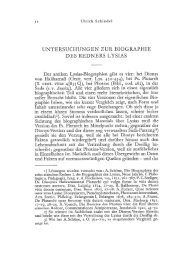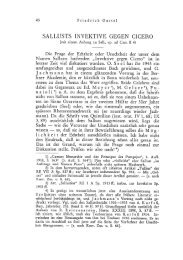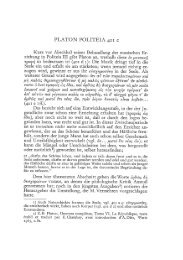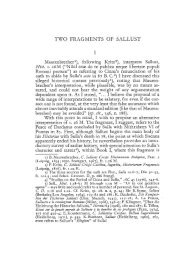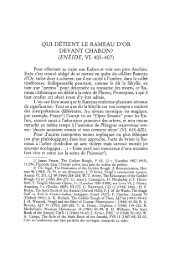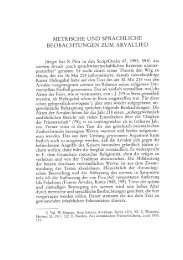VIRGILIO E STESICORO Una ricerca sulla Tabula Iliaca Capitolina *
VIRGILIO E STESICORO Una ricerca sulla Tabula Iliaca Capitolina *
VIRGILIO E STESICORO Una ricerca sulla Tabula Iliaca Capitolina *
Erfolgreiche ePaper selbst erstellen
Machen Sie aus Ihren PDF Publikationen ein blätterbares Flipbook mit unserer einzigartigen Google optimierten e-Paper Software.
200 David Wardle<br />
Girardet’s hypothesis requires us to posit an otherwise unattested<br />
recusatio ignored by the source whose narrative account is the basis<br />
of discussions of the years 29–27. 68 My analysis of chapter 28<br />
has emphasised the idea that Augustus is looking to a continuation<br />
of power, hence the edict should not be connected with Octavian’s<br />
laying down of powers. I propose that this edict is best understood<br />
as one element of Augustus’ public response to the senatorial<br />
decree and the subsequent popular vote of the cognomen Augustus,<br />
in the aftermath of his being voted a cumulation of provincial commands<br />
for ten years. 69 Possible support for this may be found in<br />
the carefully chosen language of the part of the edict which we possess<br />
if we can see an allusion to the new name of Augustus in the<br />
use of auctor. Certainly the edict proclaims Augustus’ keenness to<br />
stress his role as (re-)founder of Rome and his vision of a continuing<br />
role for himself in Roman political life. He is, then, committing<br />
himself in a very solemn form to a mission of on-going salvation<br />
of the state. All of these factors are particularly relevant to<br />
what has often been called the ‘first constitutional settlement’, in<br />
fact a process beginning in 28 and concluded in January 27, in<br />
which the foundations of principate as an institution were laid. 70<br />
This context is, I think, particularly attractive if Augustus was offered<br />
and also assumed general oversight of the res publica, but any<br />
such cura is not essential to the argument. 71 Neither the situation<br />
68) Cf. J. Béranger, ‹Le refus de pouvoir›, in: F. Paschoud and P. Ducrey<br />
(edd.), Principatus: Études de notions d’histoire politiques dans l’Antiquité grécoromaine,<br />
Geneva 1975, 165–90. Girardet’s subsidiary argument ([above, n. 2] 241)<br />
that reflections of the hypothetical recusatio of 29 can be detected in Livy’s account<br />
(5.49–55) of the interactions between Camillus and the Senate after the Gallic invasion<br />
depends too much on the writing of the first pentad being contemporary with<br />
the former events, whereas there is a case to be made for seeing Livy as a writer of<br />
the triumviral period (e. g. P. J. Burton, The Last Republican Historian: a New Date<br />
for Livy’s First Pentad, Historia 49, 2000, 429–46).<br />
69) Cf. Magdelain, for whom the edict inspired the motion of Munatius<br />
Plancus. On the difficulties of Magdelain’s order, see Chilver (above, n. 59) 422. A<br />
simple reversal overcomes these and a consequence would be to salvage the belief<br />
of Kenneth Scott, so often a most perceptive writer on the early principate, that the<br />
words of this edict “surely belong only to a solemn inaugural ceremony” ([above,<br />
n. 36] 46). On Augustus’ provinces and powers in the settlement of January 27, see<br />
Ferrary (above, n. 34) 108–13.<br />
70) For the importance of including all Augustus’ key actions of 28 B. C. in<br />
the transition to the Principate, see Rich and Williams (above, n. 37) esp. 196–9.<br />
71) See above Liebeschuetz quoted in n. 34; followed by Rich and Williams<br />
(above, n. 37) 211–2.


